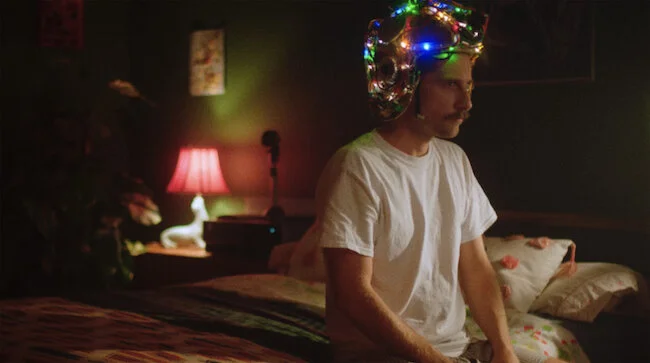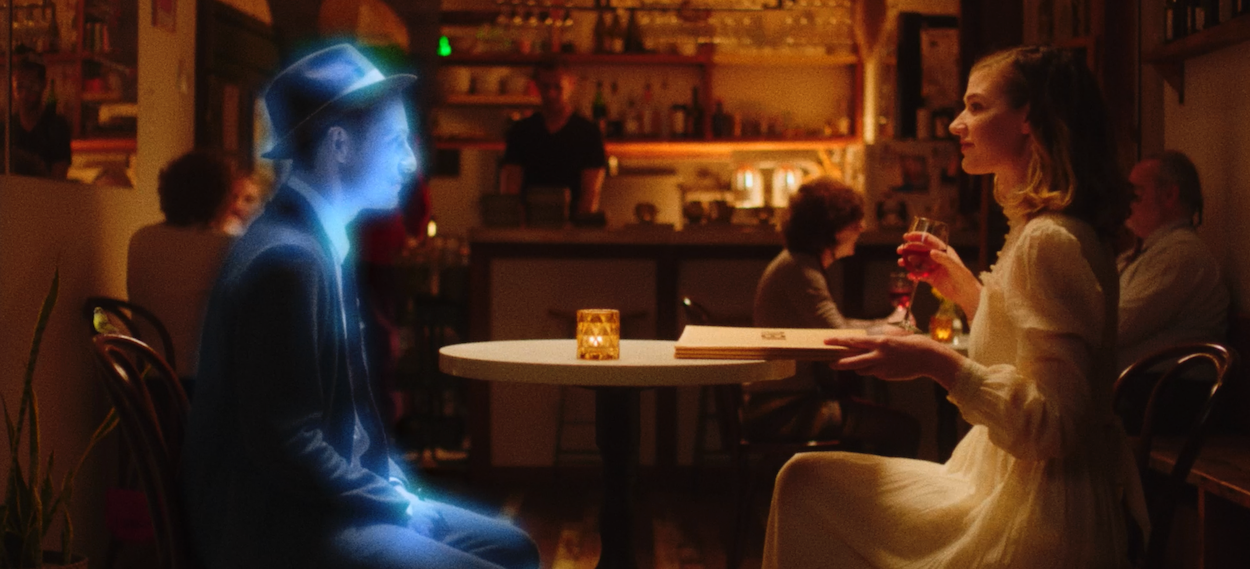STRAWBERRY MANSION (2021) [Fantasia 2021]
Perhaps it’s a testament to just how bleak or leaden the vast majority of films were in the mid-to-late ‘90s that caused so many quirky movies to be made and released afterwards. The pendulum swung hard away from that drab cynicism and produced so many different titles and filmmakers that made works full of cute weirdos in their bizarre worlds (that aren’t so dissimilar from our own, kaawink) with overwrought fantastical elements captured in cardboard and other leftovers from latchkey childhoods to deliver pat messages about seizing the day or living life or whatever. There are some filmmakers who can still pull it off, though they’ve also adjusted their approaches as they’ve aged, like Miranda July, Michel Gondry, and Wes Anderson amongst others who take these idiosyncratic built atop whimsy but infused with a real sadness and grounded by a true sense of the human condition.
What we once welcomed as a sweet rebuke to those gray cinematic experiences quickly became saccharine and gross; we recognize why younger versions of ourselves would love these quasi-experimental (but not really) takes that mesh genres and aesthetics while touting that the freaks shall inherit, but we also recognize that we’ve moved on. STRAWBERRY MANSION has a lot of hallmarks of those twee hipster projects—tryhard flicks that are like an overeager puppy desperate to be adored but instead just annoy and embarrass.
But the new film from writers/directors Kentucker Audley and Albert Birney manages to mostly avoid all of those traps to deliver something inventive, weird (in the good way), striking, and full of genuine emotion. Screened for Fantasia Fest 2021, STRAWBERRY MANSION is flawed (especially in terms of pacing), but also an incredibly clever blending of multiple genres to deliver a remarkably rich experience.
In the not too distant future, government agent James Preble (Kentucker Audley) is dispatched to audit the dreams of Arabella Isadora (Penny Fuller). He arrives at her bright pink home and finds an eccentric personality who has stacks of videos of her dreams for the auditor to comb through (even though most people went digital long ago). As Preble goes through the many years of Bella’s fantasies, he notices strange elements (strange even for the subconscious) that seem to notice and interact with him. He also notices what appears to be intrusions from some other, outside force into her mind. Preble’s own fantasies, complete with its safe space and reassuring Buddy (Linas Phillips), change as he conducts the audit and even solves a few mysteries. Who is the beguiling woman (Grace Glowicki) that beckons to him in Bella’s dreams and his own? And why is this all leading to a contentious showdown with Bella’s son, Peter Bloom (Reed Birney)?
As noted, there is ample evidence in STRAWBERRY MANSION that would make the film easy to dismiss as a quirky hipster indie. It combines adult neuroses with childhood imagination complete with ramshackle wardrobe, sets, and more that has a strong “adorkable” quality of some local art sensation rallying friends to put on a show. And it is all of those things…but it’s never annoying, with Audley and Birney’s work never once ringing hollow or forced. Too many twee films feel like a Carrot Top routine where it’s one prop out of the chest followed by a pun after another, with the result being an audience that recognizes the craft to make the prop and the cleverness to make the pun, but that’s as deep as it goes. Those jokes don’t linger and eventually each superglued monstrosity ends up becoming part of the same basic pitch over and over.
STRAWBERRY MANSION has winking elements—use of an all pink room for Preble’s subconscious sanctum, the dream viewer that has to operate with VHS, a special sleep helmet that looks like a Lite-Brite mated with a colander—but they all feel folded in to the story and attached to deeper meanings. These parts, filtered through a strong unique aesthetic, are part of the larger story which itself is in service to more interesting emotions and character developments.
Audley does well as the government man who is bedecked in ‘50s finery, complete with hat and mustache. In many ways Preble is a stand-in for the “square” archetype (and that is his role for the first 15 minutes or so), but from outset it is already a bit off when audiences meet him in his glaring pink room enjoying some delicious fried chicken. This isn’t simply a BRAZIL-esque cog in the machine with a dream, but someone with a sadness about him; he gets to seem many people’s dreams, and yet seems resolved to treat everything fantastic as perfunctory.
The subtle transformation the character undertakes, through Audley’s excellent chemistry with Fuller and Glowicki, manages to siphon off the bored sense of inevitability but find genuine curiosity and changes in demeanor. It’s not a showy performance (perhaps outside of when he commands a ship crewed by Mousepeople), but Audley uses expectations of this stock character type to sneak in a lot more weariness than expected, which is what makes the possibility of something new and something better all that more enticing and powerful in the story.
Fuller also shines in a role that could have basically been “psychotronic Ruth Gordon” from HAROLD AND MAUDE. She does have her odd mannerisms that seem forced at first (though are later redeemed in a clever way), but all of those idiosyncrasies belie a real person with a real life. Perhaps the eccentric persona is something that has been erected as a defense mechanism, or simply the result of the adventures in the dreamtime; but it is clearly not the sum of who Bella is and audiences may be caught off guard by the misdirect of a quirky caricature that is actually just a human being doing her best.
The overall story is a great slice of Philip K. Dick near future paranoia mixed with sort of fantastical flights one would find in a Tom Robbins’ novel.
Though it is a part of the film, the fact that it’s not solely a “if you want to be free, be free” narrative about someone’s existential awakening sets it apart as having more of a purpose than the usually rousing cries of “carpe diem!” or the cinematic embodiment of Natalie Portman’s character in GARDEN STATE.
STRAWBERRY MANSION has a true sci-fi thriller plot (that’s been used in other areas like Max Headroom and a few other works) which grounds the proceedings and establishes the psyche arena as a battleground in a manner that is all too familiar for people today; we have tools and abilities to create wondrous things but capitalism must always find its way into poisoning the well.
Audley and Birney also approach the dreamworld from multiple angles, outside of that plot-centric framework. Some of the dreams are very mundane, but with the odd touches that don’t quite make sense; some are full of incredible creatures from myths and legends, but with emotional beats and characters that are recognizable from waking life.
And most are a unique blend of these levels, so there may be a massive demon with which characters must contend, but it’s a beast that has the banal evening schedule of any working schlub. All of these flights of fancy are captured through a nice mix of impressive stylization that doesn’t show any sign of budget restraint and other more DIY analog sets and props that belie the childlike nature within the dreamscape. It is here, in STRAWBERRY MANSION’s quasi-INCEPTION mode (or PAPRIKA, if you prefer) of diving deeper into the slumbering mind, that some pacing issues occur. This may be meant to evoke a sense of an epic journey and make the transformation of the characters and resolution of the plot feel more earned, but there is more wheel-spinning than necessary; not a lot, but enough that it stilts the momentum.
Cardboard dream sets; large clunky machines using analog tech to complete impossible actions; non sequitur dialogue delivered by oddball people or mythic creatures; a tale of spiritual resurrection through the bright lights of fantasy. These are all the ingredients of movies that audiences have seen multiple times and only occasionally work. Some work on the first viewing, but have no staying power as the cynical real world reveals how pat the philosophies at the hearts of the films really are. STRAWBERRY MANSION is riddled with these aspects, but it makes sure to couple them with true humanity, earnest emotion, and enough of a grounded plot with its own semblance of cynicism that it doesn’t flee like twee manipulation. Audley and Birney have made a quirky film, but one that is actually charming and truly engaging. Running a gamut of emotions in a bizarre version of our world through authentic characters and uniquely designed sequences, STRAWBERRY MANSION evades all of the traps to deliver a sincerely captivating film.









